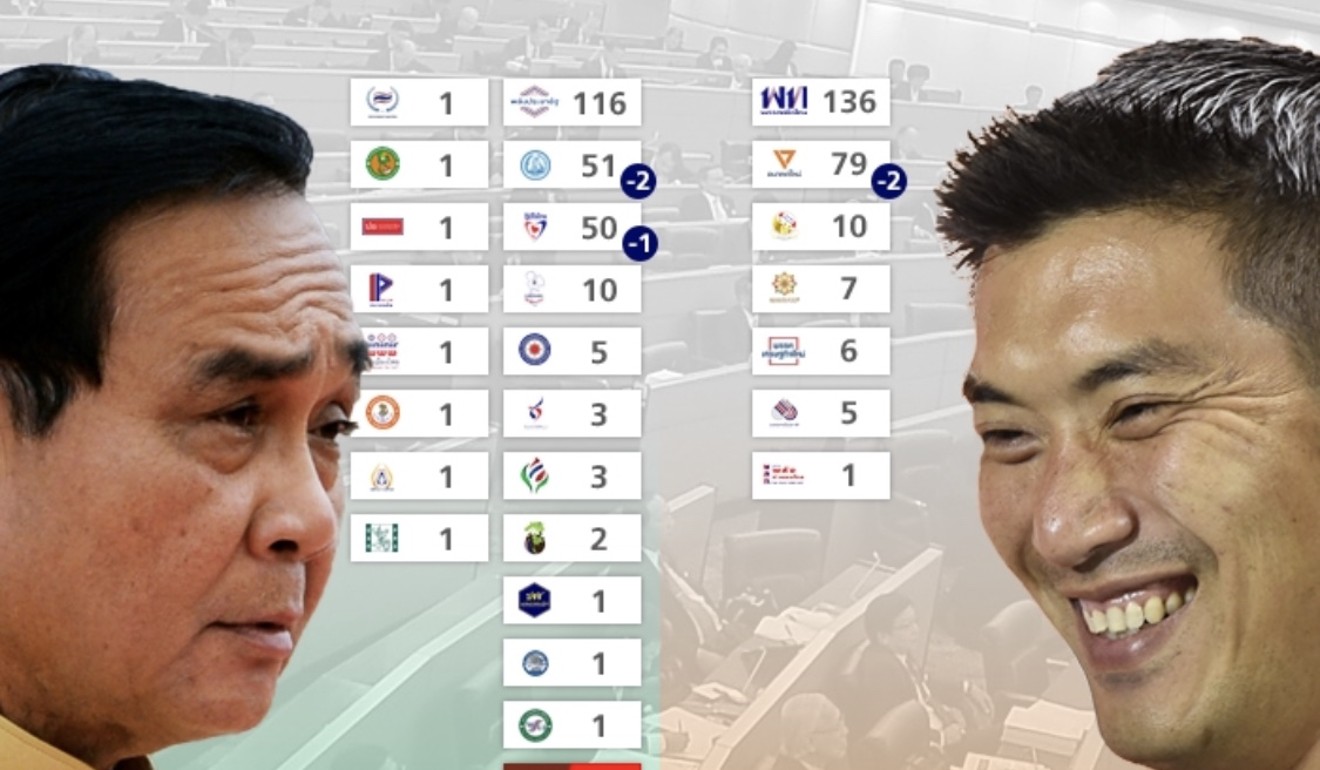
Reality bites in Thailand as ‘political cobras’ return Prime Minister Prayuth Chan-ocha
- Prayuth Chan-ocha beat his pro-democracy rival 500 votes to just 244, with help from a hand-picked Senate and a coalition of allied politicians who traded campaign promises for cosy cabinet positions
While Prayuth far surpassed the 376 votes needed out of the 750 from the lower House of Representatives and the Senate combined, his victory came after a long and heated parliamentary debate over the pro-military candidate’s suitability for the top job, the military’s opaque selection of the Senate, and legalities around the upper house’s role in the prime ministerial voting process.

Prayuth will now proceed to form his cabinet, which is expected to include members from the parties that backed his candidacy and struck deals ahead of the parliamentary vote.
Palang Pracharat Party had tacit support from the Democrat Party, Phumjai Thai Party, Chart Thai Party, Chart Pattana Party and other smaller parties. This coalition of more than 250 House MPs was supplemented by the hand-picked Senators – reaching a grand total of 500 potential votes.
Chinese arms: cheaper than US, no strings attached. Thailand is sold

If nothing else, this week’s parliamentary vote revealed the decadency of Thai politicians, who would abandon their principles and renege on campaign pledges without scruples in exchange for Cabinet posts and personal gain.
Many small and medium parties, including the Democrat Party and Phumjai Thai Party, were blatant in their opposition to Prayuth during the election campaign. But the lure of Cabinet positions and cash incentives by the pro-military Palang Pracharat Party proved too much for them to resist.
Thailand’s ‘New Right’ seeks to suppress the country’s democracy
These politicians are commonly referred to as “political cobras”, a metaphor for turncoats or lawmakers who defy party directives and vote for the opposing side. Rewards for the turncoat “cobras” were reportedly worth anywhere between US$1 and US$4 million, while just voting for the military-dominated bench could have earned a tidy few hundred-thousand dollars.

The constitution was written with two main objectives: to secure the continuation of the authoritarian regime that took power by military coup in 2014, and to prevent Puea Thai party from coming to power again. The constitution provides for election laws that favour smaller parties and the wholly appointed 250 member Senate, which would then vote en masse for the next prime ministerial candidate.
No less important, the Senate would also serve as a rearguard for the military-backed government to ensure its stability and longevity. As long as the government has a majority in the lower house, a compliant Senate will help the passing of legislation.
Conversely, if the government does not hold the majority in the lower house, the Senate’s role becomes just as indispensable. Not only can minority government pass laws of any reformatory nature through a majority in the Senate, but it is the upper house that approves public spending if the lower house fails to pass a draft budget.
Additionally, in a scenario where a minority government is forced to resign by no-confidence vote in the lower house, the Senate has the power to elect a prime minister nominated by the military, thereby ensuring the continuity of the authoritarian rule.
Thai election: a political laundering by the junta to earn legitimacy

In short, the current constitution is designed to serve an authoritarian regime, whether it is a majority government or a minority government.
In addition to cementing the junta’s authoritarian regime, Prayuth’s victory awards him some degree of legitimacy at home and abroad. But his legacy as a notorious offender of human rights and his disdain for democratic norms will not earn him much respect or trust from the international community.
It remains to be seen if the incoming regime can move the country forward rather than backwards, which was where we left off with Prayuth’s government before the March 24 election.
Pithaya Pookaman is a former Thai ambassador to Bangladesh, Bhutan, Chile, and Ecuador. He was also a former vice-minister of Natural Resources and Environment. He resides in Bangkok. He is also a member of the Puea Thai party. This article represents his personal views.

